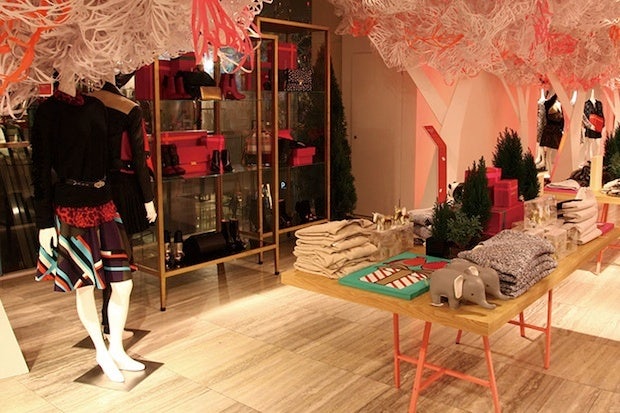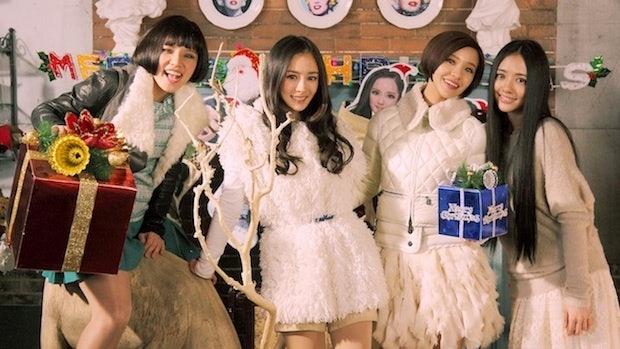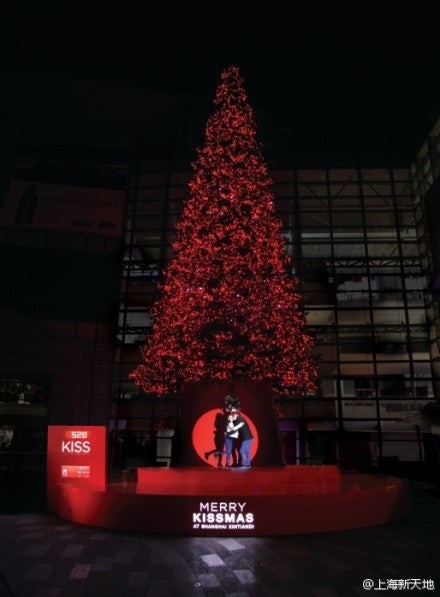
Lane Crawford's "Winter Wonderland" decorations. (Lane Crawford)
A Marilyn Monroe-themed giant Santa statue in Taiyuan, a Christmas tree made of beer bottles in Changzhou, and an “underwater Christmas party” in Jinan make clear that Christmas is getting big in China, and China celebrates the holiday in its own way. As Christmas becomes more ubiquitous in the country, luxury retailers, brands, and hotels have latched onto a prime marketing opportunity, with hopes of making the Christmas shopping season just as important as it is in the West.
According to a recent article on Women of China, Christmas is getting bigger every year in the country:
"This year in particular has seen a strong Christmas atmosphere in China," said Hao Litong, a sales manager at King Tree Handicrafts Company, adding that Chinese buyers are interested in high-quality Christmas products.
According to her, the company's sales of Christmas products on the Chinese market increased 30 percent year-on-year to about 2 million yuan (US$321,000) in 2012.
"In previous years, they were only buying Christmas trees. But now you see that they buy more decorations for the trees. Christmas products are gradually being accepted by Chinese people," Hao said.
The company started targeting Chinese consumers seriously in 2010. Most of the trees it sells in China go to hotels and shopping malls that celebrate Christmas.
The holiday takes a place in Chinese culture that is quite different from what it is in the West. Its foreign origin makes it much more “trendy” in China than it is in the Western world, where it’s more associated with family and tradition. While family time is reserved for traditional Chinese holidays such as Spring Festival, Christmas is a time for friends. Its stylish connotations are apparent in the fact that the holiday is often featured in Chinese romantic comedies such as the hits Sophie’s Revenge with Zhang Ziyi and Fan Bingbing and this year’s blockbuster Tiny Times. China has developed many of its own Christmas traditions, such as giving apples to friends on Christmas Eve because the Chinese word for the day (ping an ye) sounds like the word for “apple” (pingguo).

The characters of Chinese blockbuster Tiny Times help contribute to the "stylish" image of Christmas in China.
However, there’s one thing that China and the West definitely have in common when it comes to Christmas: shopping. Just like in the United States, retailers are jumping at the opportunity to use the holiday for marketing.
Department stores in China have embraced the Christmas spirit. In Shanghai, 10 Corso Como’s restaurant is featuring a special Christmas menu by chef Corrado Michelazzo from December 24 to 26th. Galeries Lafayette in Beijing is hosting a special Christmas pop-up shop, while Lane Crawford unveiled its “Winter Wonderland” decorations and has been running gift promotions all month.
Meanwhile, Shanghai’s Xintiandi shopping center designed a “kiss-powered” Christmas tree, which only lights up when two people stand under it and hold onto the branches. The tree, created by London-based Paul Cocksedge Studio, draws inspiration from the magnolia, Shanghai’s official city flower. A digital counter surrounding the tree will keep track of the kisses, and every kiss will result in a donation to charity. The event is also being heavily promoted on the shopping center’s Sina Weibo page.

Shopping center Xintiandi's "kiss-powered" Christmas tree. (Sina Weibo/Xintiandi)
Philanthropy also factors heavily in luxury hotels’ Christmas marketing, showing the increased importance of corporate social responsibility (CSR) in China. For example, the Park Hyatt Beijing held a charity fundraising tree-lighting ceremony, the Hilton Shanghai lobby features a Christmas village with a toy train riding through to promote its Christmas charity program, China World Hotel hosted a “Christmas Tree of Hope” event to raise funds for a school for the children of migrant workers, the Regent Beijing teamed up with a charity that helps orphans with visual impairments for a joint choir performance at a Christmas tree lighting ceremony, and the Ritz-Carlton Tianjin will host a “Teddy Bear Afternoon Tea,” after which the teddy bears will be sent to a charity for children with autism.
Hotels are also coming up with other creative marketing activities for Christmas: the most elaborate is likely at the Peninsula Shanghai, which brought a skating rink to the bund’s Waitanyuan Culture Square to coincide with the hotel’s Christmas tree lighting ceremony. Meanwhile, Shangri-La Chengdu displayed lights in the shape of a Christmas tree up to its 36th story, and the St. Regis Tianjin will have live entertainment for Christmas. Christmas menus are in abundance at hotels, but as with many other aspects of Christmas in China, they’re not copying the West: Raffles Beijing will be hosting a “Fairy Tale Party” with turkey and seafood, while the Peninsula Beijing will have a gourmet seafood menu with Cantonese dishes on Christmas for 688 RMB a person.
Individual luxury brands are using Chinese social media to promote Christmas campaigns to their fans. This week, Jing Daily covered Sina Weibo and WeChat Christmas campaigns by Lacoste, Lancôme, Coach, and Ferrari, but there are a host of other brands making Christmas marketing efforts. Piaget and Cartier are marketing their global Christmas campaigns on Sina Weibo, while Zegna is sponsoring a “MERRY X’Mas” campaign, in which the letters of the words “MERRY” represented Zegna gifts that are “modern, elegant, retro, reserved, and yuletide”-themed.
Chinese social media is also useful for international retailers to promote Christmas campaigns to Chinese travelers. One of the most innovative was perhaps a campaign created by London department store Harrods, which hid several gifts around the store with the Sina Weibo logo and then encouraged fans to find them for the chance to win prizes.